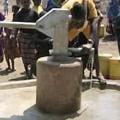 來自48國家,超過138個民間團體及工會,力勸各國政府撤回對世界銀行的資助,因為世界銀行決定將水資源的供應與運送私有化。社運人士表示,水資源和空氣一樣對生命至關重要,因此,有水可用應是基本人權之一。
來自48國家,超過138個民間團體及工會,力勸各國政府撤回對世界銀行的資助,因為世界銀行決定將水資源的供應與運送私有化。社運人士表示,水資源和空氣一樣對生命至關重要,因此,有水可用應是基本人權之一。
社運團體此次抗議的對象是世界銀行的「公私合作公共建設諮詢基金」(Public-Private Infrastructure Advisory Facility,PPIAF),PPIAF業務範圍包括交通運輸、電信與水資源。他們指稱,PPIAF所謂的水資源「方案」傾向走私有化路線,這代表各國政府提供的金援並未被妥善的運用。
由於5月23日是13個PPIAF金援國家開會的日子,社運團體特別對此展開呼籲,運作的團體包括英國的「世界發展運動組織」(World Development Movement,WDM)、地球之友國際總會、挪威團體FIVAS,以及荷蘭的全球化觀察機構「跨國研究中心」(Transnational Institute,TNI)。
英國政府是PPIAF最大宗贊助者,占50%以上,從1990年至2008年估計共捐助5300萬英鎊(約1.04億美元)。2007年初,挪威政府宣布將不再捐助PPIAF,因為不相信PPIAF有提升水資源普及率,讓更多窮人有水可用。社運團體在公開信中指出:「證據顯示,私部門對於供給窮困民眾乾淨且負擔得起的民生用水,十足不情願。」
在一些PPIAF正推動水資源私有化的貧窮國家,也有非政府組織參與這項運動,他們在聲明中表示:「我們認為,捐款應更妥善應用,因此我們希望金援國家能撤回他們的錢。」
PPIAF則在會議前發表一份公開聲明做回應,他們表示,PPIAF的作法是在幫助人民獲得乾淨的飲用水,「解決之道並不是公營或是私營擇一,只要兼採兩者優點,建立一套創新的公私合作關係,每個人都能從中獲利。」
More than 138 civil society groups and trade unions from 48 countries are urging donor governments to withdraw their support for an agency of the World Bank determined to privatize the supply and delivery of water. The campaigners say that water, like air, is so essential to life that access to it is a human right.
In an open letter, groups argue that the bias of the Public-Private Infrastructure Advisory Facility, PPIAF, towards private sector "solutions" to water access represents a poor use of aid money. PPIAF works in a range of sectors including transport, and telecommunications, but this open letter is directed towards the agency's activities in the water sector.
Coordinated by the World Development Movement, Friends of the Earth International, the Norwegian group FIVAS, and the Transnational Institute, the letter was released ahead of a May 23 meeting of the 13 donors to PPIAF.
The UK is the largest donor by far, contributing over 50 percent of PPIAF's funds, an amount which totals £53 million (US$104 million) from 1999 through 2008. Earlier this year, the Norwegian government announced that it will not support PPIAF in the future as it no longer believes the agency is increasing access to water for the poor.
In their open letter to PPIAF’s remaining donors, the groups say, "The evidence shows that the private sector has shown a great reluctance to commit finance to connecting the poorest people to clean, affordable water."
"Our conclusion is that aid could be better spent and we ask donors to withdraw this funding accordingly," wrote the nongovernmental organizations, including some from poor countries where PPIAF has funded water privatization processes.
PPIAF says its activities in the water sector help people to obtain clean drinking water. In a statement issued in advance of the May 23 meeting, PPIAF says, "Solutions don't have to be either public or private - everyone can benefit from creative partnerships that recognize the strengths of both."
全文及圖片詳見 ENS報導







